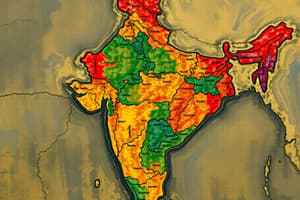Podcast
Questions and Answers
What is your definition of social class?
What is your definition of social class?
Social class is a state of mind, income, education, homes, and race.
Why does Vessa Rinehart want to change her social class?
Why does Vessa Rinehart want to change her social class?
Vessa wants to change her social class because she doesn't want to attract men in her own social class.
A transformation in social class does not require money to back it up.
A transformation in social class does not require money to back it up.
False (B)
What is the conflict within the black community regarding class identity and racial identity?
What is the conflict within the black community regarding class identity and racial identity?
What does it mean to be at the bottom culturally, socially, politically, and economically?
What does it mean to be at the bottom culturally, socially, politically, and economically?
In what ways is Tammy invisible?
In what ways is Tammy invisible?
What conflicts does Dana have when she leaves her home in rural Kentucky?
What conflicts does Dana have when she leaves her home in rural Kentucky?
A person can be a member of more than one class.
A person can be a member of more than one class.
It is impossible to change social class.
It is impossible to change social class.
Flashcards are hidden until you start studying
Study Notes
Social Class
- Social class is defined as a state of mind encompassing income, education, homes, and race.
- Components of social class include financial status, educational background, type of residence, and racial identity.
Vessa Rinehart's Aspiration
- Vessa Rinehart seeks to elevate her social class to attract wealthier partners.
- She hires Ginie Sayles for $1,500 to assist in her social ascension.
- While transformation is feasible, it requires financial resources to sustain the new lifestyle.
- Challenges include the pressure to maintain expensive appearances and navigate societal expectations.
Class and Racial Identity Conflict
- The Black community faces complexities regarding class and racial identities.
- The Jack and Jill club serves as a social network aimed at elevating the social status of Black families.
- Tensions arise between "upper-class" Black individuals in exclusive clubs versus those excluded from such circles.
Wealth Disparities
- Some individuals achieve wealth without the typical effort associated with working hard, raising questions about privilege and opportunity.
Tammy Crabtree's Situation
- Tammy lives in a dilapidated trailer with her four children and works at Burger King, traveling ten miles to her job.
- She aspires to improve her circumstances by pursuing a college education to become a teacher.
- The term "the bottom" reflects her low status across cultural, social, political, and economic dimensions.
Tammy's Visibility Issues
- Tammy is perceived as "invisible" in society, indicating her struggles to be acknowledged or respected.
- She is labeled 'trash' by neighbors, highlighting social stigmas associated with her living conditions and economic status.
Dana’s Conflict
- Dana experiences internal conflict upon relocating from rural Kentucky to Washington, DC to pursue journalism.
- The decision to "move up" comes with costs, including potential alienation from her roots and community.
Class Membership
- Individuals can belong to multiple social classes simultaneously, reflecting the complexities of identity and societal roles.
Possibility of Changing Social Class
- Changing social class is a debated idea; while transitions can occur, they often necessitate significant resources and support systems.
Studying That Suits You
Use AI to generate personalized quizzes and flashcards to suit your learning preferences.




